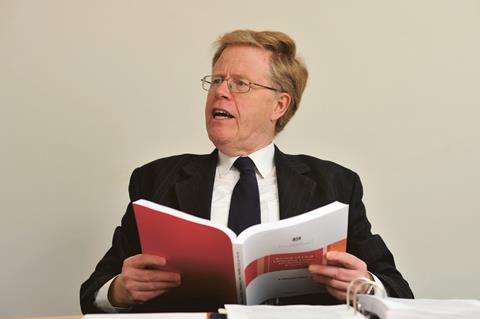The expansion of the fixed recoverable costs regime to a much wider range of civil cases of a value of up to £100,000 this October – with the introduction of a new intermediate track above the fast track (cases of a value up to £25,000 heard over one day) – has brought into sharp relief the need for the government finally to address the problems posed by the existing regime. Issues concerning the fixed recoverable advocacy fee are of particular relevance to the bar.

A fixed recoverable costs regime for fast track civil cases was introduced as part of the Woolf reforms in 1999 to create costs certainty, reduce the need for ancillary disputes on costs, and overall to reduce the legal costs of the litigation of disputes of modest value above the ‘no-costs’ regime of the small claims track. Part of the fixed recoverable costs regime is a fixed recoverable advocacy fee, payable only on the one-day trial taking place.
The trigger and level for recovery of the advocacy fee is absolutely critical because it effectively sets if and what the advocate gets paid. Many, if not most, of these cases are conducted on the basis of a conditional fee (or ‘no win, no fee’). There simply is no fee paid unless it is recovered from the defendant.
A key characteristic of this regime is that it does not involve the spending of tax-payer money (unless the state happens to be a party to the litigation). It is an unusual intervention then, where for policy reasons the state is involved in the regulation of what the providers of legal services may get paid. It is this aspect that has caused the Bar Council surprise as to why the government has apparently been so reluctant to reform.
For well over a decade, advocates have been short-changed by the existing costs recovery arrangements.
First, the advocacy fee levels, first set in 1999 and then uprated in 2007, with new bands introduced in 2009 and 2013, have not been updated to reflect inflation for a decade and a half. The Bar Council has for many years sought that the level of the fees that may be recoverable be set at figures that fully reflect inflation taken from the point in time that they were set.
The ‘Noughties’ fee levels were set as part of Sir Rupert Jackson’s (pictured) civil costs reports at a level that was considered to be a reasonable fee. For example, the lowest rate for the ‘all in’ advocacy fee is £485, to cover all preparation, travel expenses, and trial advocacy, and was set in – and has not been uprated since – October 2007.

In order for there to be viable junior bar to carry out this work, it is essential that a reasonable fee be paid. That requires the fee levels to be uprated taking account of inflation.
Second, the Bar Council considers that the advocacy fee should be recoverable in part (and, therefore, payable to the advocate) when a case settles shortly before the date of trial or if the trial is vacated, after significant preparation has been carried out. The basis for this demand is simple fairness: those who carry out work should be entitled to be paid for it. It also fits with the government’s agenda to encourage parties and their advisers to contemplate settlement, to avoid the need for the use of scarce court resources for the final trial hearing and in order to reduce the backlogs and delays in the civil courts.
Lawyers and parties getting to grips with the merits of a case before going to the court hearing should be encouraged, or at least not actively disadvantaged, which is what happens at present, where the advocacy fee is only recoverable if the hearing takes place.
Third, the levels of the recoverable advocacy fee should be automatically indexed each year so cutting out the need for the debilitating semi-regular cycle of lobbying and dispute with government on the above matters.
The Bar Council has been pursuing its current round of lobbying since at least 2019, and is pleased that there has, finally, been some movement by the government. First, by the statutory instrument laid in May 2023, which includes a partial indexation of the advocacy fee, although peculiarly from the wrong date – uplifting it from 2016, not from when it was last set in 2013. Second, and most recently, in proposals contained in a further consultation on issues relating to the new regime, issued in late July.
The Bar Council will, of course, engage fully in the consultation exercise. On first look it seems to recognise the fairness of, and make some movement in relation to, extending the indexation and to provide for part payment in some circumstances of settlement or vacation of the trial. But, unfortunately, only limited steps in relation to each are proposed and the government simply does not even raise for consultation the automatic uprating of the fee levels so that we can all avoid these disputes in the future.
Prior to this consultation, the Bar Council had been of the view that the government had simply ignored its half-decade long efforts to inform and persuade and that the position reflected in the May 2023 statutory instrument is irrational and unreasonable. A judicial review seemed inevitable.
A letter before action is being sent. The Bar Council hopes that if it is answered fully and frankly it may be possible, in the light of the new consultation, to defer any challenge to the lawfulness of the scheme until the outcome of the July consultation is known.
We very much hope that this will mark a sea change in the approach to the bar’s concerns and that the principle of ‘reasonable pay for work done’ can be reflected in the government’s fixed recoverable costs regime.
Sam Townend KC is vice-chair of the Bar Council































2 Readers' comments